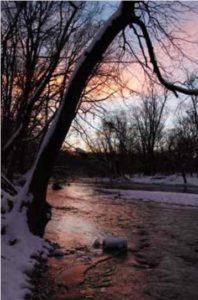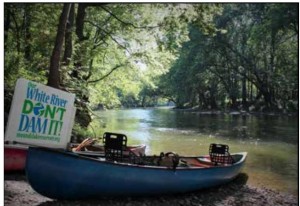by Jeff Stant, IFA Executive Director, and Marian Berky, Heart of the River
Heart of the River News Conference Statement
Heart of the River is a grassroots community organization of concerned citizens dedicated to preserving a free-flowing White River. We, members of this community, banded together in 2013 to oppose the construction of a dam on the White River in Anderson to create Mounds Lake Reservoir. Since that time we have volunteered our time and money to educate our community and oppose this project.

Heart of the River, along with its many coalition partners including the Indiana Forest Alliance, has called this news conference on this spring equinox, to publicly respond to the Phase II study of the proposal to build a dam on the White River within the city limits of Anderson, IN. This study, contracted by the Corporation for Economic Development, conducted by DLZ Engineering firm, and funded by the taxpayers of the state of Indiana at the cost of $600,000, falls short of being an objective, thorough investigative study of the feasibility of creating a reservoir in Madison and Delaware counties. In fact, the document raises more questions than it answers and it fails to address critical concerns.
Affirming our conclusion is a March 4, 2015, in-depth critique of Phase I and II Studies by fourteen Ball State University researchers. In their critique they state:
We believe that neither the rigor of the methods of evaluation nor the detail of the information presented in both the Phase I and Phase II Studies are sufficient for the public to evaluate the degree of adverse effects or the financial feasibility of this proposal. In particular, at this juncture, the conclusion of financial feasibility of the Mounds Lake Reservoir is not supported by the data or analysis presented in Phase I and Phase II studies.
Furthermore, this week, the Delaware County Board of Health has identified four potential concerns about the Mounds Lake Project that could negatively impact the health and safety of county residents and users.
Therefore, the Heart of the River Coalition, along with many concerned citizens of central Indiana, calls on the Anderson Corporation for Economic Development to withdraw its plan to the eight governing entities in Madison and Delaware counties to form the Mounds Lake Commission. Furthermore, it is our request that all consideration of this project be abandoned.
For its proponents, the Phase II study produced no red flags that would prevent the project from moving forward. We see red flags everywhere! We consider this project to be fatally flawed for the following reasons:
Good and sound science states that this project is not feasible. Phase I and II studies are insufficient, flawed, and incomplete.
There has been no objective cost analysis study indicating that construction of a reservoir would have a positive impact on the local economies.

The stated purpose of the project, to provide for future water needs in central Indiana, is based on an erroneous assumption. As a matter of fact, of twenty solutions created to solve a hypothetical water shortage in the next 35-50 years by Citizen’s Water of Indianapolis, the least cost-effective, at number twenty, is building a reservoir. According to authoritative sources, central Indiana water supplies are sufficient for the next 30-50 years.
Given that the premise of the argument for this project is faulty, the proposal to fund the project by selling the water once the dam is constructed is fatally flawed. It is unlikely the CED will find customers for the water, thereby leaving a potential billion-dollar debt for Madison and Delaware county taxpayers.
Over four hundred families would be forced from their homes, many businesses would be closed or moved. A designated nature preserve within Mounds State Park would be destroyed and one-third of the park would be inundated, putting at risk the historic Adena-Hopewell Mounds. Over one hundred designated archeological sites would be flooded. One thousand acres of rare riparian forest would be felled to make way for this reservoir. The study proposes to mitigate the effects of the flood. The fact is, however, much of this damage could not be mitigated.
Should this project move forward through the initiation of the Phase Three study or the formation of the proposed Mounds Lake Commission, it will provide fertile ground for legal action based on both state and federal statutes as well as legal resistance from the affected property owners.
This project has serious potential to run afoul of Indiana state statutes. It would constitute an appropriation of a free-flowing river, a portion of Mounds State Park, and the destruction of Mounds Fen State nature preserve, all of which are part of the public trust held for all future generations of Indiana residents. Furthermore, building the reservoir clearly does not rise to the “imperative and unavoidable public necessity” required by the State Nature Preserves Act for the destruction of the Mounds Fen Nature Preserve.
The proposed reservoir would also face federal legal challenges. It would clearly not be considered the “Least Damaging Practicable Alternative” for water supply, which is required to obtain a Clean Water Act section 404 permit from the U. S. government. The likelihood that the endangered Indiana bat and the soon to be listed as endangered Northern Long-eared Bat make their homes in Mounds State Park creates Endangered Species Act problems for this proposal as well.
Finally, civil lawsuits by affected residents and business owners are almost certain to be filed if this project advances to the permitting stage, potentially draining the coffers of the communities forming the proposed Mounds Lake Commission.
Therefore, realizing that the revitalization of the economies of Madison and Delaware Counties was the purpose of this proposal, we offer an alternative. We invite the Anderson Corporation for Economic Development to partner with us, Heart of the River, our coalition partners, and our community, to explore alternative plans that embrace the White River corridor as an integral element of our natural heritage and community fabric. Work with us to create a plan that will protect a free-flowing White River. In doing so, we will safeguard the sensitive ecosystems and forests, protect our archaeological and historic sites, and craft a plan that rejects the use of Eminent Domain. One alternative, conceived by the Hoosier Environmental Council, is the Mounds Greenway proposal. Perhaps this would be a good place to begin our conversations.

